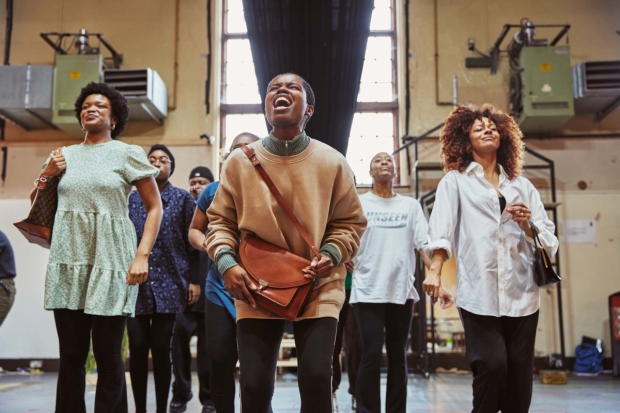”The Secret Life of Bees” review – Almeida musical makes the right kind of buzz

© Marc Brenner
It tells the coming-of-age story of a white teenager, Lily (Eleanor Worthington-Cox), who escapes with her Black housekeeper Rosaleen (Abiona Omonua) following a racist attack to the sanctuary provided by a sisterhood of beekeepers in South Carolina.
They’ve been led there by a postcard left to Lily by her late mother, who died in murky circumstances following a row with her abusive father T-Ray (Mark Meadows). It features a picture of a Black Madonna, which turns out to be a wooden bust that belongs to the three Boatwright sisters – August, May and June – and adorns their delicious jars of honey.
Duncan Sheik, he of Spring Awakening fame (also recently seen at this address), has written a score that is a rich profusion of musical reference points from gospel to country and everything in between. The standouts are the ensemble numbers sung by the group around their beloved bust, as they harmonise to her spiritual power in “Tek a Hol a My Sol” and “Our Lady Of Chains”, and the stirring a capella “Hold this House Together”.
The lyrics by Susan Birkenhead at times feel too neatly rhymed – even comically so at one point – but there’s great heart, and humour too, particularly in the subplot of Tarinn Callender’s character Neil’s many attempts to persuade surly sister June (Ava Brennan) to marry him.
Book writer Lynn Nottage manages to fillet the story down to its bare essentials, even if it leans heavily on archetypes. Little about the plot (which many will know already, if not from the book then the big screen adaptation) comes as a surprise, and Lily’s big revelation, when it arrives, is anticlimactic. The historical facts that pepper the action also feel a little glib.
However: that music, that company, that band (who are sadly hidden away behind black screens). There is so much to enjoy about Whitney White’s pared-down production, played out on Soutra Gilmour’s grass-fringed set, warmly lit by Neil Austin to evoke every degree of the southern heat, that quibbling over character and plot feels petty. The choreography by Shelley Maxwell includes some lovely virtuosity, but – without wishing to hammer home the metaphors – it all knits together like a well-formed waggle dance, the revolving stage neatly emphasising this feel.
And there are performances of real star quality, led by Rachel John as matriarch (or queen bee) August, whose warmth and optimism are a match for the brightness of the setting. Brennan’s June and Danielle Fiamanya’s May nicely complete the trilogy, and their sibling dynamics are echoed in the relationship of Worthington-Cox’s naïf Lily and Omonua’s steely Rosaleen. Other notables include Noah Thomas’s Zachary, whose love for Lily runs into the harsh realities of segregation, and the aforementioned Callender who brings the house down with his final, desperate appeal to June, “Marry Me”.
This is a company in tune with each other in every sense, and a production that in the end is impossible to resist. I’m not convinced the show will prove a mainstream success, short as it is on knock-out tunes, but it’s a highly enjoyable chamber piece that speaks to issues we still see rumbling on today (scenes of racist police brutality are particularly evocative). It may be a wholly American story, but it should rightly make a buzz on this side of the pond.














